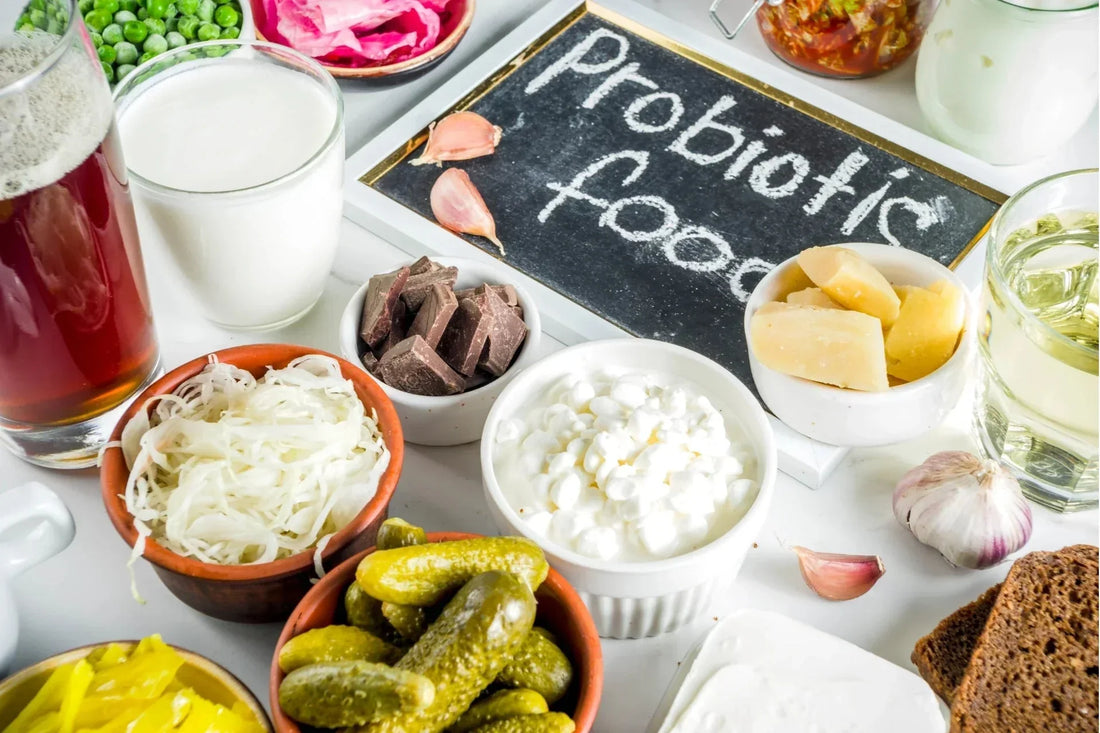Prebiotics vs. Probiotics: One Could Be the Key to Better Digestion
Gut health got you confused? You’re not alone.
When you dive into the world of wellness, especially topics like gut health or holistic nutrition, it can feel like decoding a whole new language.
Take prebiotics vs. probiotics, for instance. They might sound similar, but they play very different (and equally important) roles in your digestive system, especially when it comes to supporting weight loss and overall health.
But don’t worry. We’re here to make things simple, snappy, and snackable (pun intended). We’ll break down the differences in a way that’s easy to digest, just like the foods we’ll be talking about.
Curious? Scroll on.
Basic Fundamentals: Prebiotics vs Probiotics
Prebiotics and probiotics are two interconnected components of a healthy gut bacteria.
Prebiotics are types of non-digestible plant fibers that pass through the upper part of the digestive tract and serve as food for the beneficial bacteria (probiotics) in your gut.
So while your body can’t digest prebiotics, your good gut bacteria (probiotics) can. And that’s the whole point.
Think of your gut as a garden: probiotics are the beneficial plants (bacteria) you want to nurture, while prebiotics serve as the fertilizer that helps these plants thrive.
Without sufficient fertilizer, even the healthiest plants have a hard time growing.
Likewise, if there is a lack of prebiotics, your probiotic bacteria may not flourish as they should.
Prebiotics act as food for probiotics and other beneficial bacteria already present in your gut.
These indigestible fiber compounds pass through your upper digestive tract unnoticed until they reach the colon, where they are fermented by your gut microbiota.
This fermentation process promotes the growth of helpful bacteria.
On the other hand, probiotics are living organisms that, when ingested, join the community of beneficial bacteria in your intestines. These helpful bacteria support the digestive process, help extract nutrients from food, and play a crucial role in immune system functions.
The Fundamental Differences: Nature, Function, and Sources
The primary difference between prebiotics vs probiotics is found in their inherent characteristics. The following will give you details about the individual role they play in making your body healthy:
1. Different Nature
Prebiotics and probiotics are fundamentally different in what they are.
Prebiotics are non-living, indigestible fibers, mostly carbohydrates like inulin and fructooligosaccharides (FOS). Your body doesn’t digest these fibers, but your gut bacteria do, which makes them incredibly valuable for gut health.
Probiotics, in contrast, are live microorganisms, specific strains of bacteria or yeast that provide health benefits when consumed in sufficient quantities. Think of them as reinforcements for your gut’s existing army of good bacteria.
2. Different Functions
Their roles inside your body are also distinct.
Prebiotics act as food for the good bacteria already living in your gut. They help create an environment where those beneficial microbes can thrive and multiply.
Probiotics, on the other hand, introduce more beneficial bacteria directly into your system. They add to the population of good microbes, supporting your digestion, immunity, and even mental health.
3. Different Sources
Their sources in food are just as different as their functions.
Where to Find Prebiotics
Prebiotics naturally occur in a wide range of plant-based foods, especially high fiber foods and those rich in complex carbohydrates. Common sources include:
- Onions
- Garlic, which actively promotes the growth of good bacteria
- Savoy cabbage, with about 2.2 grams of prebiotic fiber per cup
- Leeks, another member of the Allium family
- Cashews, offering around 3.3 grams of prebiotic fiber per 100 grams
- Jerusalem artichokes, rich in inulin and containing about 2 grams per 100 grams
- Barley, which supports the growth of probiotic bacteria
Where to Find Probiotics
Probiotics are found in fermented foods and supplements. Popular probiotic-rich options include:
- Yogurt with live active cultures
- Fermented vegetables, such as sauerkraut
- Tempeh and other fermented soy products
- Kefir, a tangy, cultured milk drink
- Kombucha, a fermented tea
- Miso, a traditional Japanese seasoning made from fermented soybeans
- Kimchi, a spicy fermented Korean side dish
What does the Latest Research on Prebiotic and Probiotic Foods Say?
Recent studies have broadened our understanding of how prebiotics and probiotics affect various health aspects beyond simple digestion.
Weight Management:
A clinical trial from 2023 published in Endocrinology, Diabetes & Metabolism explored the impact of prebiotic and probiotic supplementation on weight loss and metabolic factors in individuals with obesity.
Gastrointestinal Health:
Probiotics have consistently demonstrated advantages for gastrointestinal health. For people dealing with irritable bowel syndrome (IBS), probiotics have alleviated symptoms.
Metabolic Health:
The trial above involved 45 participants who were obese, revealing important insights into how prebiotics and probiotics can aid in weight management.
All participants made lifestyle adjustments, with some receiving daily prebiotic supplementation of 30g of carb, while others took probiotics containing various beneficial strains, both of which showed notable advantages.
Findings indicated that all groups lost weight; however, those in the prebiotic and probiotic categories experienced more substantial reductions in fat mass and enhancements in muscle strength.
Moreover, the group taking prebiotics exhibited lower diabetes rates compared to those following only the diet, whereas the probiotic group showed marked improvements in fasting blood glucose levels.
Mental Health:
The connection between the gut and the brain is one of the most intriguing topics in recent microbiome studies. The prebiotic group reported better sleep quality along with reductions in depression, anxiety, and stress levels, highlighting the intricate link between gut health and mental wellness.
When to Take Prebiotics vs. Probiotics?
This is the most common question that often comes up while discussing supplements.
Though there is various research, it doesn't prescribe exact timing if you are going for weight loss.
Here are the simple principles you may follow:
Prebiotics can be consumed throughout the day through food sources, supplements, or high fiber snacks. Because they're not living organisms, they're more stable and less affected by stomach acid.
Probiotics may benefit from being taken at specific times. Some experts suggest taking them shortly before or with meals containing some fat, which might help buffer stomach acid and improve the survival of the probiotic organisms.
For those taking both, the combination may offer enhanced benefits, as the prebiotics specifically nourish the probiotics you're introducing to your system.
Prebiotics vs. Probiotics for Weight Loss
The clinical trial referenced earlier provides compelling evidence that prebiotics and probiotics can aid in weight loss, especially when paired with dietary modifications.
It is particularly noteworthy how these two approaches seem to function through distinct mechanisms:
Prebiotics appear to have a greater impact on insulin sensitivity and metabolic indicators.
Probiotics, on the other hand, displayed more significant effects on fasting blood glucose levels.
Both can enhance body composition beyond what you can imagine and what could be achieved through diet alone. This implies that for effective weight management, a combined strategy might be the most beneficial.
Practical Implementation: Creating a Gut-Friendly Lifestyle
Instead of viewing prebiotics and probiotics as mutually exclusive, think about integrating both into your daily habits:
1. Expand your diet by incorporating a variety of plant foods that are high in prebiotic fibers.
2. Add fermented foods to your meals a few times a week to naturally boost your probiotic intake.
3. Consider taking supplements if your diet falls short, especially during times of stress or after taking antibiotics.
4. 100 Cal Snacks also offers some delicious yet nutritious snacks that are keto-friendly and low in carbs. And, you will be amazed to see a flavored range like BBQ protein puffs, chocolate protein bars, and peanut butter bars.
5. Maintain consistency, as enhancing gut health often requires dedicated effort over several weeks or even months.
How is 100 Cal Snacks Pioneering Gut Health?

100 Cal Snacks is a brand founded on the belief that healthy eating can be effortless, tasty, and nourishing simultaneously. We create wholesome and delightfully indulgent snacks that benefit your gut.
At 100 Cal Snacks, we are pro-gut health, making sure our snacks are nutritious and easily digestible. The thoughtfully crafted nutrient profile helps in lowering inflammation, preventing bloating, and boosting overall digestive health.
The tussle of prebiotic vs probiotic foods needs a collaboration that offers overall gut health. Our snacks achieve that- with each offering a good amount of high quality protein, low carbs, and healthy doses of fiber.
All this while being portion controlled at only 100 calories, without any added sugars or sugar alcohols.
Try out our BBQ Protein Puffs, Chocolate Brownie Protein Bars and Peanut Butter Protein Bars today to become a healthier and more energetic you!




